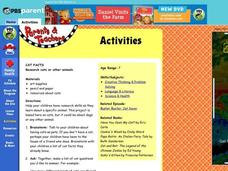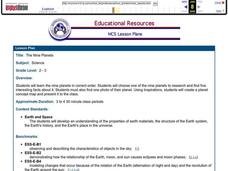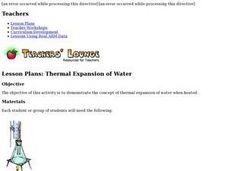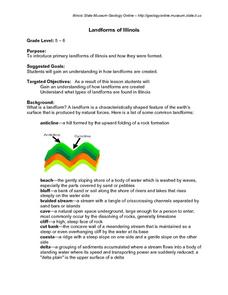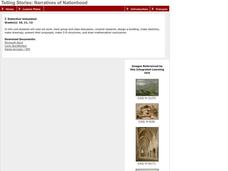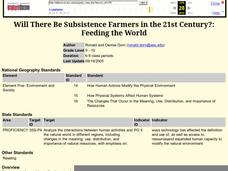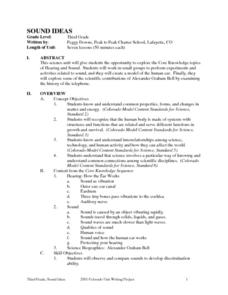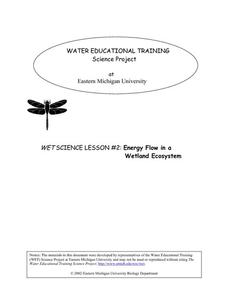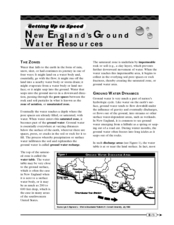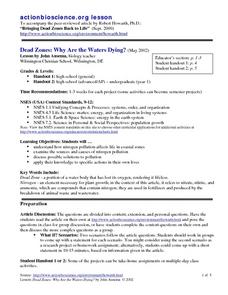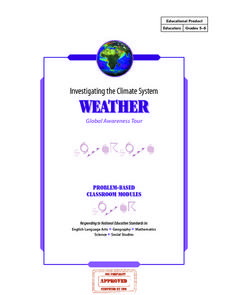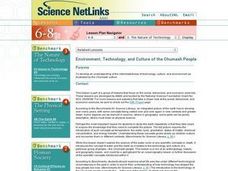Howard Hughes Medical Institute
Scientific Inquiry Using WildCam Gorongosa
How do scientists determine what questions to ask to meet their research goals? Help your class develop an inquiry mindset with a lesson based on studies in the Gorongosa National Park. Partners create their own research questions by...
Kenan Fellows
What Element Would You Be?
Primo Levi wrote a collection of short stories comparing his life from Italy to Auschwitz to elements in the periodic table. Pupils read an excerpt from his book and research the characteristics of various elements. Then, they make a...
Howard Hughes Medical Institute
Neural Control of Walking and Running
Physical therapists state that relearning how to walk often motivates stroke and brain injury patients. Researchers spend a great deal of time focused on understanding the neural control required for walking. They pass along that...
Kenan Fellows
An Analytical Chemist, a Biochemist, an Animal Scientist, and an Oncologist Walk into a Lab...No Joke
Oncology presents multiple opportunities for research and the collaboration of many different types of scientists. Scholars divide into groups and research the history of mass spectrometry, polarity/non-polarity,...
Howard Hughes Medical Institute
Classroom Activities: Stem Cells and Diabetes
How close are we to a cure for diabetes? It seems the cure which has a connection to stem cell research is a possibility! Learners explore the concept of stem cells with an engaging hands-on activity. A PowerPoint presentation provides...
Children’s Hospital of Philadelphia
Vaccine Safety
Enter the debate on vaccines. Small groups research topics related to vaccine safety in the last lesson in a unit of five. In the process of the research, team members learn how to determine the validity and credibility of a website. The...
Curated OER
Cat Facts
Kids love cats! Here is a lesson that invites youngsters to do some research on the critters. They must answer questions such as: "How many different kinds of cats are there?" "Why did Egyptians worship cats?" and, "How far can cats...
Curated OER
Life in the Crystal Palace
Marine biologists research sea ice communities. Assign some groups to construct paper models of sea ice communities in winter, and some to construct models of them in summer. The lesson is simplistic, but the Internet resources provided...
Curated OER
The Nine Planets
A solid lesson on teaching the nine planets in our solar system is here for you. In it, young scientists learn the correct order of the planets, and they choose one of the planets to do a research report on. They must come up with five...
US Department of Energy
Thermal Expansion of Water: Rise of Sea Level
Using bunsen burners, Erlenmeyer flasks, thermometers, hollow glass tubes, stoppers, and rulers, learners experiment with and measure how water expands when heated. The activity connects the expansion of water when heated to global...
Curated OER
Landforms of Illinois
Fifth and sixth graders are introduced to the primary landforms of Illinois and discover how they were created. Landform cards are made for each pupil. They use the twenty-questions format until they have identified each one. Then,...
Curated OER
Astronomers and Their Tools
Ninth graders have the opportunity to prepare arguments with like-minded classmates for what they believe to be the next logical step in astronomical research, in an effort to convince their opposing classmates of their position.
Curated OER
Distortion Unleashed
Here is a series of four lessons which examine the relationship between 3-D structures and the places in which they exist. The images of Robert Harris are used, and learners engage in a research project to look deeper into a structure of...
Curated OER
Close Observation: Coins
Integrate math, science, and speaking/listening with a collaborative hands-on activity. Each group works with a single penny, examining it with the naked eye and recording observations. Repeat using magnifying glasses. Then repeat with a...
Curated OER
Will There Be Subsistence Farmers in the 21st Century?: Feeding the World
Students examine the topic of subsistence farming. They research the future of subsistence agriculture, identify the types and locations of subsistence agriculture, and write about subsistence farming in regards to developing nations and...
Curated OER
Sound Ideas
Complete a unit of lessons on hearing and sound. Learners conduct sound experiments, research the history of the telephone and scientific contributions of Alexander Graham Bell, and create a model of the human ear.
Eastern Michigan University
Energy Flow in a Wetland Ecosystem
How is energy transferred within an ecosystem? What would happen to a food web if one of the organisms was removed? Elementary or middle school ecologists examine these questions and more in a comprehensive 5E learning cycle lesson....
Environmental Protection Agency (EPA)
New England's Ground Water Resources
Learn all about where ground water is stored, how it moves, and how it is accessed in a detailed and thorough 10-page reading. Whether supplementing reading for an existing environmental or earth science course or providing background...
Curated OER
The Prairie Climate
Ninth graders research the average temperature and precipitation of a prairie region to determine the type of climate it is, and how it differs from other biomes. They examine the types of adaptions animals have made to live in the...
Curated OER
Dead Zones: Why Are the Waters Dying?
Students investigate the effects of pollution on marine ecosystems. They read and discuss an article, identify the effects of pollution on marine life, conduct research on local nutrient pollution, and conduct local water quality studies.
Curated OER
The Environment
Young scholars explore the issues that influence our environment and research ways to decrease the negative impact that humans have on the environment. Misconceptions about environmental issues are addressed in this instructional activity.
Curated OER
Investigating the Climate System WEATHER
Young scholars research, interpret, and become able to explain general characteristics of weather in tropical regions. Students observe and compare tropical and mid-latitude weather patterns.
NOAA
It's a Roughy Life
Scientists recently discovered several previously unknown species at the Bear Seamount off the coast of New England. Scholars research these new species — benthopelagic, benthic, and seamount fish — and find out what makes them unique....
Curated OER
Environment, Technology, and Culture of the Chumash People
Students develop an understanding of the interrelatedness of technology, culture, and environment as illustrated by the Chumash culture. They research the tribe and complete a table for the Chumash people describing their environment,...
Other popular searches
- Research Tools
- Research Projects
- Research Skills
- Author Research
- Internet Research
- Environment Research Projects
- Country Report
- Research Paper Outline
- Computer Research
- Research Papers
- Research Paper Lesson Plans
- Animal Research








